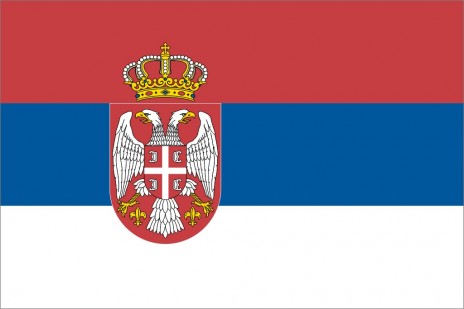Serbia en-us-Serbia.ogg /%u02C8s%u025Crbi%u0259/ (help·info) (Serbian: %u0421%u0440%u0431%u0438%u0458%u0430, Srbija), officially the Republic of Serbia (Serbian: %u0420%u0435%u043F%u0443%u0431%u043B%u 0438%u043A%u0430 %u0421%u0440%u0431%u0438%u0458%u0430, Republika Srbija), is a country located in both Central and Southeastern Europe. Its territory covers southern part of the Pannonian Plain and central part of the Balkans. Serbia is bordered by Hungary to the north; Romania and Bulgaria to the east; the Republic of Macedonia and Albania[6] to the south; and Croatia, Bosnia and Herzegovina and Montenegro to the west. The country's capital, Belgrade, was titled "City of the Future of South Europe" in 2006.[7] Although landlocked , Serbia has 2,000 km of navigable waterways on the Danube, Sava, Tisza and their respective canals,[8] through which it forms part of a European canal network, connecting the North Sea with the Black Sea.[9]
For centuries, located at, and shaped by, the cultural boundaries between the East and the West, the Serbian medieval kingdom - later renamed the Serbian Empire[10] - occupied much of the Balkans. The Serbian state disappeared by the mid-16th century, torn by domestic feuds, Ottoman, Venetian, Hungarian and later, Austrian occupations. The success of the Serbian revolution against Ottoman rule in 1817 marked the birth of the Principality of Serbia, centered in the %u0160umadija region. This was the first nation-state in CEE.[11] Formal independence was enacted in 1878. In 1912 Kosovo was reacquired from the Ottoman Empire[12] and the Austro-Hungarian occupation of Ra%u0161ka (Sand%u017Eak) was terminated. In 1918 the region of Syrmia, followed by the former autonomous Habsburg crownland of Vojvodina, proclaimed their secession from Austria-Hungary to unite with the Kingdom of Serbia.
The current borders of the country were established after World War II, when Serbia became a federal unit within the Socialist Federal Republic of Yugoslavia. Following the breakup of Yugoslavia in the 1990s, Serbia once again became an independent state in 2006, following the Montenegrin independence referendum. Serbia is a member of the United Nations, the Organization for Security and Co-operation in Europe, and the Council of Europe which it presided over in 2007. It is also a potential candidate for membership in the European Union and a militarily neutral country.[13]
In February 2008, the parliament of Kosovo unilaterally declared independence from Serbia. Serbia asserts Kosovo as its southern province ruled by a temporary government, setup by the United Nations, in accordance with the Resolution 1244. Serbia's government, as well as the UN Security Council, has not recognized Kosovo's independence. The response from the international community has been mixed. Presently, Kosovo is recognized by 60 out of 192 UN member states. On October 8, 2008, the UN General Assembly approved Serbia's request to ask a U.N. court if Kosovo's secession was legal. The International Court of Justice was expected to take one to two years to issue its opinion .[14]


